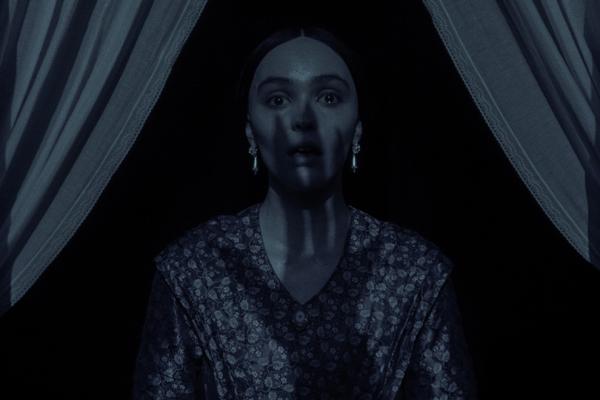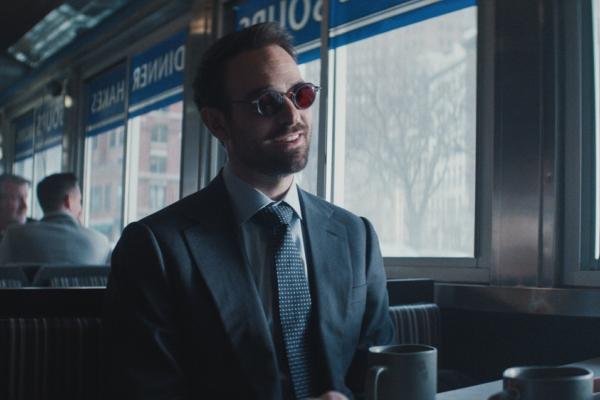I once ran several blocks at midnight to see Kanye West. To unveil his first single “New Slaves” from his album Yeezus, the rapper was projecting the song’s music video on buildings around the world, and divinely, a music hall on my college campus in Chicago was one of them. Before I realized that I was among the chosen, I watched repeatedly on YouTube a fan-recorded video of an-already-occurred projection elsewhere. Later, at the music hall, I was proud of my ability to rap along with Yeezus, having already memorized the lyrics to “New Slaves” — “My mama was raised in the era when / Clean water was only served to the fairer skin” — ahead of many, if not all, of my peers.
I debated beginning this review of the Netflix documentary jeen-yuhs: A Kanye Trilogy with such a self-focused start — because writing about Kanye doesn’t mean I should give in to my own narcissism, and the misogyny in “New Slaves,” I must admit, is as clear now as it was then — but there’s a point to the anecdote. Looking at West, who legally changed his name to “Ye” in 2021, can be both difficult and easy. Easy because of his genius: how he put Chicago on the map as a hub for brilliant rap music, widened the lane for non-gangster rappers, and somehow made tunes seriously considering Jesus so sonically innovative and catchy that some become radio staples, paving the path for Kendrick Lamar and Chance the Rapper. Difficult because of his public antics: the outbursts, the flamboyance, the drama. Recently Kanye’s displays have even become dangerous, harassing his wife Kim Kardashian, who has filed for divorce, and threatening her rumored boyfriend Pete Davidson.
“The more time I spent with Kanye,” director Coodie Simmons says in voiceover, “the more I wanted him to win.” This is spoken during early 2000s footage of Kanye’s struggle to get a record deal. Coodie, inspired by the documentary Hoop Dreams, has decided to veer a bit from his budding career as a comedian to record the rise of his friend Kanye: a much-sought-out hip-hop producer who sees himself more as a rapper. Eventually, Coodie is joined in the endeavor by Chike Ozah, a friend of his and Kanye. But, having only seen part one of the three-part documentary, I suspect Coodie’s desire for Kanye to win becomes harder to sustain the more Kanye has delved into controversy — from Ye’s instant diminishing of Taylor Swift’s Best Video by a Female Artist win over Beyoncé at the 2009 MTV Video Music Awards to the artist’s MAGA-hatted Oval Office appearance with Donald Trump and eventually his own 2020 U.S. presidential campaign, which he works on at the start of jeen-yuhs.
Coodie’s warmer presence in jeen-yuhs makes the film easier to stick with and digest. That’s crucial because Kanye is someone who must be looked at. To not recognize his influence is more than just sad. (What is life without at least one Kanye jam, or knowing that it’s possible for so much talent and ambition to exist in a single person?) Kanye’s story has so much to say about art, faith, Blackness, maleness, materialism, mental illness, class, and even — in light of his mother and his relationship struggles — love. jeen-yuhs is not as must-see as the Emmy-and Oscar-winning doc O.J. Simpson: Made in America, but, like that film, it reflects the United State’s complicated past and present — and perhaps its future. Coodie and Chike’s documentary, culled from nearly 20 years of footage, preserves for history part of the ongoing journey of an artist who has, for better or worse, shifted not just the music industry but fashion, politics, and more. Kanye West is not done changing the world.
If you were to ask Kanye who comes close to his level of influence, he would probably point to his mom, Donda West, because of her impact on him. Kanye’s mother was and is a major part of his life and thus jeen-yuhs. Early in the documentary, when Kanye visits her in the middle of his quest toward a record deal, Donda describes what a giant sees when it looks in the mirror: No one, because it’s humble. It doesn’t see what everyone else sees; it thinks of itself as equal to the people. This is a somewhat difficult analogy to follow, but its point is profound and important for Kanye to remember. “Stay on the ground,” she tells him, “and you could be in the air all at the same time.”
But Kanye doesn’t seem to possess that duality, if he ever has. (“Kanye was always self-absorbed in a way,” Donda admits on camera, recounting a hilarious story about how a kindergarten Ye got to the top of a slide and yelled at her, “I don’t need you!”)
In a way, Kanye’s story is that of the protagonist in Toni Morrison’s novel Song of Solomon — a young Black man seeking flight in a nation that has often grounded his kind or suspended them from the tops of rooted trees. But while Morrison’s main character advances in both morality and altitude, it’s unclear whether Kanye does more than the latter. Full of the elements that make all of us here on Earth, to varying degrees, beautiful and artistic and dangerous and insufferable, Kanye rises like a SpaceX rocket. To truly see him requires that we stare for a beat toward and sometimes into the Sun. Somehow we must acquire Aviators (not Ye’s shutter shades, definitely not those) to shield us from the light.
Got something to say about what you're reading? We value your feedback!







